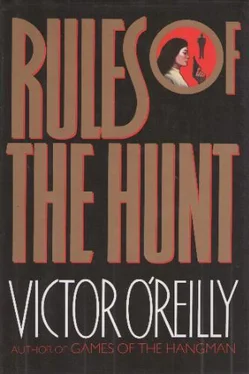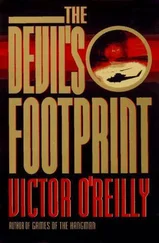Victor O'Reilly - Rules of The Hunt
Здесь есть возможность читать онлайн «Victor O'Reilly - Rules of The Hunt» весь текст электронной книги совершенно бесплатно (целиком полную версию без сокращений). В некоторых случаях можно слушать аудио, скачать через торрент в формате fb2 и присутствует краткое содержание. Жанр: Триллер, на английском языке. Описание произведения, (предисловие) а так же отзывы посетителей доступны на портале библиотеки ЛибКат.
- Название:Rules of The Hunt
- Автор:
- Жанр:
- Год:неизвестен
- ISBN:нет данных
- Рейтинг книги:4 / 5. Голосов: 1
-
Избранное:Добавить в избранное
- Отзывы:
-
Ваша оценка:
- 80
- 1
- 2
- 3
- 4
- 5
Rules of The Hunt: краткое содержание, описание и аннотация
Предлагаем к чтению аннотацию, описание, краткое содержание или предисловие (зависит от того, что написал сам автор книги «Rules of The Hunt»). Если вы не нашли необходимую информацию о книге — напишите в комментариях, мы постараемся отыскать её.
Rules of The Hunt — читать онлайн бесплатно полную книгу (весь текст) целиком
Ниже представлен текст книги, разбитый по страницам. Система сохранения места последней прочитанной страницы, позволяет с удобством читать онлайн бесплатно книгу «Rules of The Hunt», без необходимости каждый раз заново искать на чём Вы остановились. Поставьте закладку, и сможете в любой момент перейти на страницу, на которой закончили чтение.
Интервал:
Закладка:
McGonigal was not sure who true this was. Japanese businesses seemed to be everywhere these days.
They arrived at the hospital shortly after midday. Doctors' rounds would be over. Lunch would just be starting. Visitors' hours would not start until two o'clock. The place would be just about as quiet as it could be except at night. They had considered doing a nighttime hit but had scrapped it. It was too predictable. The parking lot would be nearly empty and security, as like as not, doubled. People expected a night attack. And escaping on strange roads by night was another problem.
The hospital parking lot surrounded the hospital on three sides. To the rear was a goods-delivery area and various utility buildings, including the boiler house and mortuary. McGonigal had considered going in the back way, but there was a porter there to monitor deliveries and prevent theft. A second factor against that plan was that the route through the kitchens was longer. They were housed in a single-story extension at the rear, and the terrorists would have to pass through that before entering the main building.
The parking spaces directly in front of the hospital were reserved for the senior medical staff, and there was a clearway for ambulances. Since this facility was old and small, both visitors and emergency patients were brought in through the same entrance at the front. Emergency itself was at the front across from reception. The arrangement would not have worked in a busy city hospital.
They parked on the right side of the building, out of sight of the front of the hospital, but only a few yards away from the fire escape that led up to the ward facing the private wing. McGonigal and his men were all dressed in maintenance workers' blue overalls. They got out of the cars and opened the trunks. The weapons inside were concealed under painter's tarpaulins.
McGonigal's nerves had been at fever pitch as he drove in. Every sense was honed for the slightest hint of danger, but he could see nothing amiss.
The hospital, an ugly, raw, concrete construction at the best of times and even worse when wet, and its bumpy, black asphalt parking area looked depressingly normal. The rain had stopped, but water lay in pools everywhere. The sky overhead was still heavily overcast and obscured the slightest hint of direct sunlight. The chill air complemented the gloom. The dreadful weather and the drab environment reminded McGonigal of Belfast.
He nodded at Jim Daid.
The terrorist walked around to the front of the hospital and asked to use the rest room. The receptionist paid him little attention. Daid looked around and noticed that no policeman was present. However, a garda raincoat hung from a hook in the reception area.
"Excuse me," he said politely to the receptionist. There was no reaction. He cleared his throat. "Excuse me, I'm looking for my brother."
The receptionist, a middle-aged barrel-shaped woman to whom life had not been kind, looked up from the book she was reading. This was outside visiting hours and one of the quieter times of the day, and she resented the interruption. The heroine in the book with whom she identified was young, attractive, and currently being made love to by an equally attractive hero.
She was not pleased to be reminded of real life when fantasy was so much more pleasant. "Who?" she said unpleasantly.
"He's a policeman," said Daid. "I thought he might be on duty here." He nodded toward the coat.
The receptionist shrugged. "Lunch, the rest room, who knows?"
Daid looked at her and decided further conversation was pointless. He had just come from the rest room, and that had been empty. Lunch meant the cop would return at any time, which could be inconvenient.
He then remembered that the uniforms in the Republic were not armed. It would have been neater to take him out in advance, but if he showed up later, what the fuck. Daid turned and went back to McGonigal.
McGonigal thought about what Daid had told him. The policeman's absence disturbed him, but it was too late to turn back now.
"Go," he said to Tim Pat and Gerry Dempsey. Immediately, they removed the heavy canvas tool bags from the cars and commenced climbing up the fire escape.
The metal staircase, designed to allow the ill and elderly to escape, had originally been an attractive construction. Now it was pitted and rusty, a victim of tight budgets, sloppy management, and the unrelenting Irish weather. But it was more than adequate for fast access. The two terrorists were outside the third-floor fire door in seconds.
Beyond the fire door lay the corridor of a public wing inhabited mainly by geriatric patients who would now be having their lunch. Such patients frequently required help when eating, so it was a fair assumption that the nursing staff would be preoccupied. At the end of the corridor was another fire door, and beyond that a landing and another staircase. Across the landing was an armed Ranger, the two doors of the security zone, and the private wing.
One of the terrorists outside the third-floor fire door removed a battery-operated hand drill, made a small hole in the door, and inserted a probe.
Seconds later he had engaged the crash bar and opened the door. Just before the second terrorist entered the corridor, he turned and looked down at McGonigal and gave a thumbs-up signal. Immediately, he turned and vanished.
"Sixty seconds, Jim," said McGonigal, pressing the button on his stopwatch.
The two headed toward the entrance, muttered, "We're expected" at the indifferent receptionist, and headed up the stairs. On the half-landing just above the first floor, they opened their tool bags but did not yet remove their weapons.
McGonigal checked his stopwatch again. The counterterrorist special forces were not the only people who understood timing. The Ranger outside the third-floor security zone would hear them coming, but would not be suspicious of a couple of workmen. While he was distracted, he would be shot by the boys who had come up the fire escape.
It would then be just a matter of blowing a way in with the rocket launchers. And they had Semtex, too, if something heavier was needed.
The Libyans had provided some serious firepower.
Most people's mental image of a security television camera is of a highly visible, though compact, wall-mounted metal rectangular box fronted with a lens.
A security camera looks menacing. It whirs as it rotates to follow you. Its telephoto lens can watch you in intimate close-up while its operator remains concealed. It is not a friendly piece of equipment. However, its visibility and offputting presence is part of its purpose. It is there not just to observe but to deter.
Kilmara was making some use of conventional security cameras, but the bulk of his information was coming from devices which owed more to microsurgery than to the television industry.
They were small enough to fit inside a human artery. For all practical purposes they were invisible, and the information they transmitted traveled at the speed of light along optical fibers which looked to the uninitiated – in the rare cases where they were not concealed – like ordinary house wiring.
What he saw, as he looked at his monitors, did not please him.
Of the six Rangers normally either on duty or on call, he now had five, since one was away on emergency personal leave. Now another, who he had placed in a sniper role some three hundred meters away on top of a grain silo to cover the entrance to the hospital, would be of limited use. He had expected the terrorists to park in the front to ensure themselves the fastest possible getaway. Their parking at the side was quite unexpected and put them out of the line of fire. By the time the sniper could be brought into play, the main event would be over.
Читать дальшеИнтервал:
Закладка:
Похожие книги на «Rules of The Hunt»
Представляем Вашему вниманию похожие книги на «Rules of The Hunt» списком для выбора. Мы отобрали схожую по названию и смыслу литературу в надежде предоставить читателям больше вариантов отыскать новые, интересные, ещё непрочитанные произведения.
Обсуждение, отзывы о книге «Rules of The Hunt» и просто собственные мнения читателей. Оставьте ваши комментарии, напишите, что Вы думаете о произведении, его смысле или главных героях. Укажите что конкретно понравилось, а что нет, и почему Вы так считаете.




![Беар Гриллс - The Hunt [=The Devil's Sanctuary]](/books/428447/bear-grills-the-hunt-the-devil-s-sanctuary-thumb.webp)







